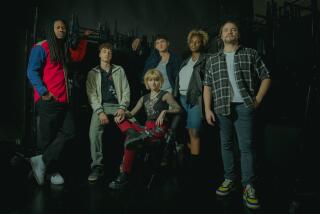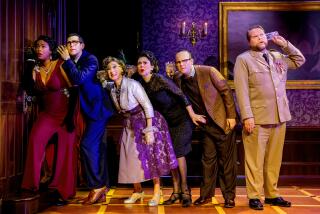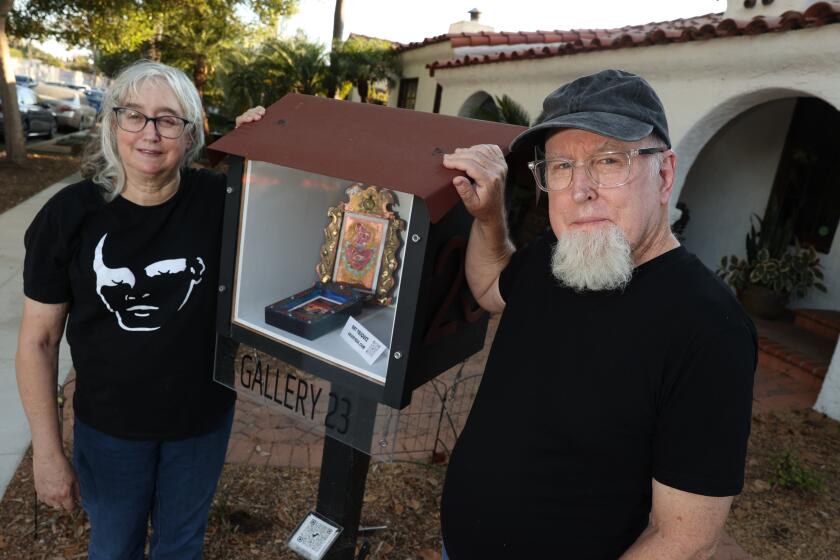Review: ‘Dog and Pony’s’ grating personalities spoil the musical fun
“Dog and Pony,” the new musical by Rick Elice (book) and Michael Patrick Walker (music and lyrics) now receiving its world premiere here at the Old Globe, tells the story of a successful screenwriting duo whose relationship isn’t quite romantic though could hardly be described as strictly professional.
“Dysfunctional” would fairly well sum it up, but dysfunctional in a way that is creatively fruitful and suffused with tender feeling. It’s this paradox that the authors of this unorthodox, small-scale and, sorry to say, often rather irritating show want to explore.
The musical runs into trouble not for flouting the traditional expectations of romantic comedy. (Sondheim and his collaborators have happily inured us to disquieting endings.) It’s that “Dog and Pony” revolves around such grating personalities that it’s hard to sustain interest in the characters, never mind feeling affection for them.
Andy (Jon Patrick Walker) calls Mags his “work-spouse” and counts on her servile devotion. The two are working on a new movie titled “American Madhouse,” and though it’s the Fourth of July weekend and Mags is supposed to be on a singles vacation in the Caribbean, she has answered the summons to Andy’s house in Connecticut, braving the ire of his unwelcoming family to be on hand in case he gets some inspiration for their stalled screenplay.
This scene, like much of the show, is told in flashbacks that are occasioned by an interview Andy and Mags are giving at an Idaho comedy festival, in which the host (Eric William Morris) asks the loaded question, “What can you tell us about the nature of your collaboration?” “American Madhouse” has just been screened and though the movie looks to be a hit, it’s not clear that their partnership has survived the difficult birth.
The Q&A frame of “Dog and Pony,” directed by Tony-winning actor Roger Rees (who received a Tony nomination for his staging of Elice’s play “Peter and the Starcatcher”), can seem like a playwriting convenience. Perhaps this is the reason Elice, who co-wrote the book for “Jersey Boys,” doesn’t wholly commit to it. For long stretches we’re tooling around in a past that’s far removed from this dog and pony show in Ketchum, Idaho, and each time we return it’s less convincing.
Unfortunately, wherever we are (Kris Stone’s scenic design sketches the various locales with efficiency), the company is extremely trying. Mags calls Andy “a vain, brilliant, terminally narcissistic procrastinator,” and she’s not simply lashing out. Even Andy agrees with the “terminally narcissistic” part.
Mags clearly harbors romantic feelings that Andy cannot reciprocate. But what’s also unmistakable is that in every place but the bedroom she is his significant other. Indeed, his attachment to her seems more profound than the bond he shares with his ticked-off wife, Jane (Heidi Blickenstaff), who occasionally unloads her marital frustration on Mags.
Andy’s gargoyle mother, Rhoda (played to the hilt by Tony-winning veteran Beth Leavel), is also fed up with the way this screenwriting interloper is always hanging around her son and threatening his comfy domestic life. “Fourth of July is family time, dear,” she tells Mags. “Don’t you have your own family?”
Why is an attractive and successful, if neurotically submissive, screenwriter subjecting herself to insults like this? That’s a question that fascinates Elice and Walker a good deal less than the curious genre-less intimacy of collaborative relationships.
In an early number, “The Nature of Our Collaboration,” Andy sings of finding “solace in your partner’s mental arms.” (This wasn’t the only time I wondered in “Dog and Pony” why characters were choosing to break out into song.) It’s an uncommon situation, though relatable in the sense that rarely does anyone find all the desired qualities in a single partner. But Andy’s selfish insistence on having everything on his own terms is wearying.
The comedy picks up in the more adventurous second act, after Andy and Jane’s marriage comes to an end and Andy and Mags test new definitions of their partnership. New strains, however, emerge once Bonnie (also played by Blickenstaff) enters Andy’s life and it becomes clear (through her farcical bluntness and malapropisms) that it’s not literary sophistication he’s after.
Laughter assuages some of the irksome behavior on display, and the show’s most memorable songs are definitely the funny ones: Bonnie’s big number, “Bonnie Doesn’t Get It,” allows Blickenstaff to redeem a cartoon dummy with an all-out musical comedy attack. This is the same strategy employed by Leavel in “Problem Solved,” in which she breathlessly portrays both Andy’s interfering mom and Mags’.
“Dog and Pony” reminded me a bit of “They’re Playing Our Song,” the late 1970s musical written by Neil Simon, Carole Bayer Sager and Marvin Hamlisch that was loosely based on Sager and Hamlisch’s union. I can’t say I’m a huge fan of that show either, but the relationship there didn’t quite lend itself so readily to pop-psychological diagnosis.
Characters in drama don’t have to be charming and wonderful, but spending time with them shouldn’t be such a chore. There’s not much that the game cast of Rees’ production can do to mitigate this. Elice courageously doesn’t go easy on Andy’s shortcomings, but he doesn’t give Mags — or the audience — much incentive for standing by him.
More to Read
The biggest entertainment stories
Get our big stories about Hollywood, film, television, music, arts, culture and more right in your inbox as soon as they publish.
You may occasionally receive promotional content from the Los Angeles Times.











